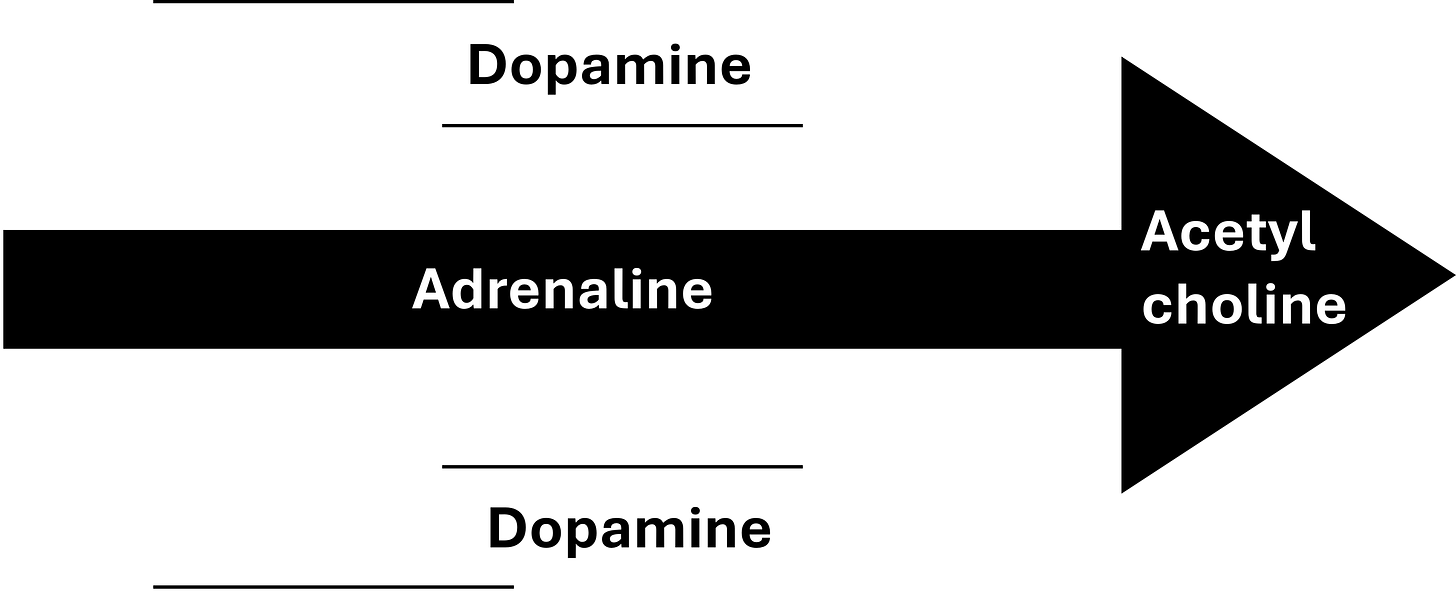Andrew Huberman - Tools to Improve Your Focus & Concentration
Use science backed tools to improve your most valuable asset.
Show - The Huberman Lab Podcast
Host/Guest - Andrew Huberman
Link to the episode - Link
Reading Time - 2.5 mins
Context and Introduction - This episode helps listeners discover the science behind focus and concentration. It delves into how hormones affect our attention and offers practical tips ranging from sleep habits to dietary choices. It provides a variety of tools, including music and supplements, to help anyone enhance their focus in everyday life.
Summry
Understanding the focus arrow: You can think of focus and concentration as an arrow. Adrenaline is the shaft of an arrow, essential but not sufficient on its own. Acetylcholine acts like the arrowhead, guiding the focus sharply or broadly, akin to a spotlight. Dopamine is like momentum, propelling the arrow forward and sustaining focus.
Behavioral Tools for Enhancing Focus:
Sleep's Fundamental Role: To significantly improve focus, aim for 6-8 hours of sleep for at least 80% of nights.
Music and Noise: 40hz binaural beats and white or pink noise can transition you from a distracted to a focused state. The speaker recommends the Brainwave app for this.
Understanding Focus Dynamics: You don’t zap in and out of focus state. You transition gradually from distraction to focus. Work with 90-minute ultradian cycles for your focus sessions. The first 5-10 minutes of this session will be spent transitioning into a focus state.
The Power of Defocus: After 90-minute sessions, engage in deliberate defocus, such as walking or relaxing. Avoid phone use during that time.
Visual Focus Techniques: Fixing your gaze on a single spot for a few minutes can sharpen your focus.
The Role of Meditation: Focus - Refocus meditation done for 10-13 mins daily can significantly improve focus. Concentrate on a point of focus, and every time your mind wanders (every 10 sec), bring it back to that point. This focus-refocus can be taxing and shouldn’t be done 4 hours before sleeping.
NSDR and Hypnosis - Non-Sleep Deep Rest and Hypnosis help with deep relaxation that, in turn, helps improve focus. You basically listen to audio scripts to feel relaxed and unlock different brain states. The speaker recommends the Reveri app for self-hypnosis.
Stress and Focus—A moderate amount of stress increases focus and concentration, which is why you get more done under deadlines. Stress releases adrenaline and changes our visual field (narrows our vision).
Nutritional Tools:
Blood Glucose Levels: Moderate glucose levels are ideal for optimal focus. Too low, and you feel hungry and distracted. Too high, and you feel sluggish.
Choline-Rich Foods: Enhance acetylcholine with choline-rich foods or supplements like AlphaGPC.
Caffeine: If consumed in appropriate dosages, it can increase focus. The dosage depends on your tolerance and can range from 100 mg to 400 mg. Most people do well with 100-200mg before a deep work session. It increases alertness (adrenaline) and dopamine’s effectiveness.
Supplemental Tools:
Omega 3: Enhances brain function and focus. Speaker's dosage: 1-3g/day.
Creatine Monohydrate: Supports muscle growth and cognitive performance. Speaker's dosage: 5g/day.
Choline (AlphaGPC): Boosts acetylcholine for improved focus. Speaker's dosage: 300-600mg, 4 days/week around 10-20 mins before a deep work session.
L Tyrosine: Increases dopamine levels, aiding in focus. Speaker's dosage: 500mg in the morning, 4 days/week.
Phenylethylamine: Improves motivation and drive, part of the PEA pathway.
Resource for Supplements: For detailed supplement information, visit Examine.com.Prescription Tools: Prescription drugs like those for ADHD can enhance focus but should be used only in specific, severe cases.
Prescription Tools: Prescription drugs like those for ADHD can enhance focus but should be used only in specific, severe cases.
Conclusion - Prioritization and Disclaimers:
Tool Prioritization: Behavioral tools precede any other tools. Always start with behavioral tools, followed by nutritional, supplemental, and, only if necessary, prescription tools.
Avoid Tool Overlap: Limit to using 2-3 tools simultaneously and not more.
Medical Disclaimer: Consult health professionals before trying new supplements or prescription tools.
Actionable Takeaways
Optimize Sleep for Enhanced Focus: Aim for nightly 6-8 hours of quality sleep. Good sleep supports the brain's ability to concentrate and maintain focus during the day.
Utilize Sound for Focus: Incorporate 40hz binaural beats and white or pink noise to help you transition into a focused state. These auditory tools can help you minimize distractions and improve concentration.
Use Visual Focusing Exercises: Regular practice of focusing on a single point for up to 3 minutes sharpens concentration skills. This exercise helps train your brain to maintain focus during tasks.
Dietary Adjustments for Cognitive Performance: For optimal focus, maintain moderate blood glucose levels with a balanced diet. Incorporate choline-rich foods to enhance acetylcholine. Omega 3 supplements (1-3g/day) can also aid brain function and focus.
Incorporate Meditation and Supplements for Focus: Practice focused meditation daily to train the brain in maintaining attention. Supplement with L Tyrosine (500mg in the morning) and Phenylethylamine to support dopamine levels, enhancing motivation and focus.
Resources Recommended
Apps
Brainwave
Reveri
Resources
Examine.com
Product
Anna Park Yerba Mate


